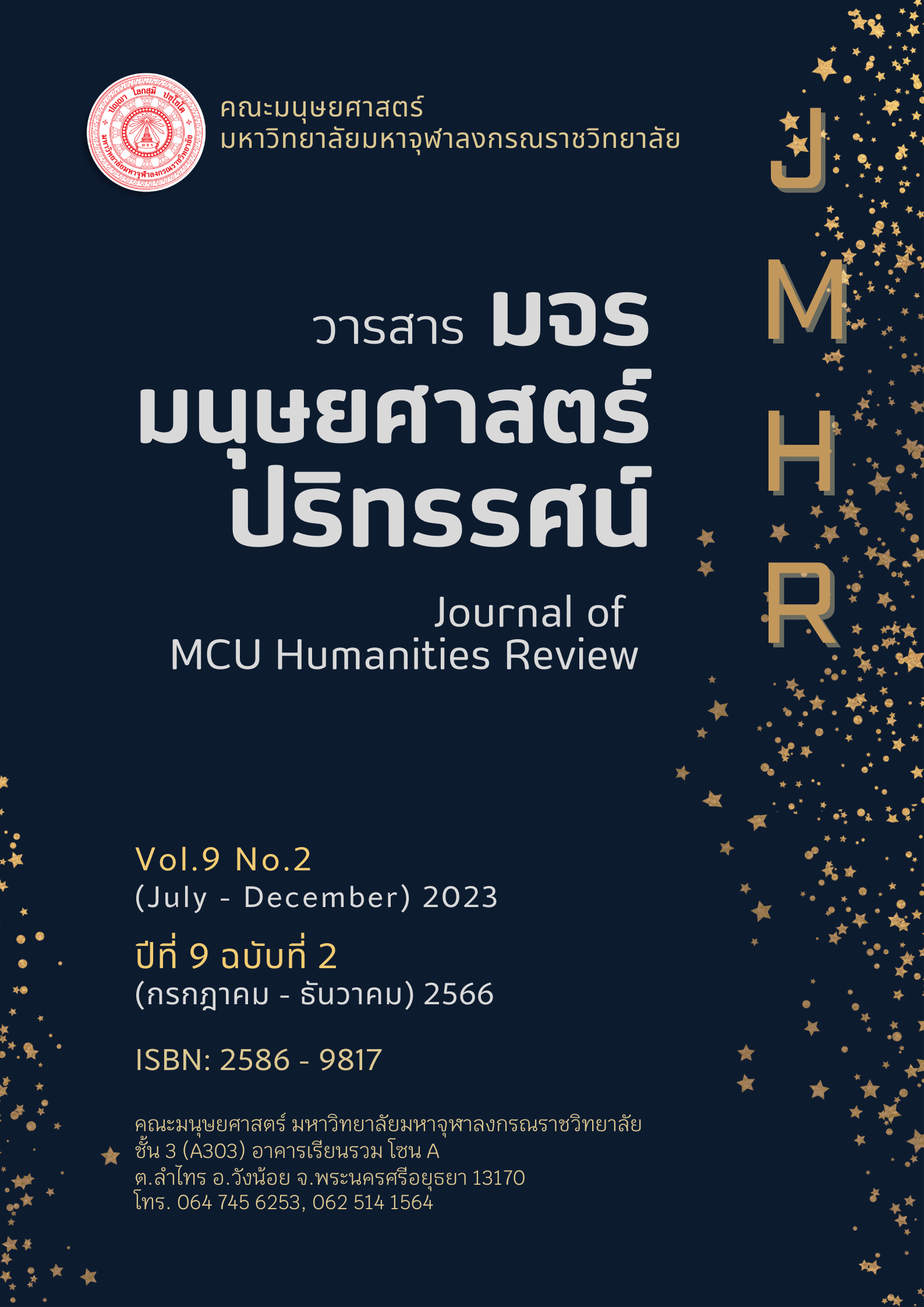ปัจจัยที่มีผลต่อการเรียนรู้และการสร้างความมั่นใจในการพูดภาษาอังกฤษ ของนิสิตหลักสูตรศิลปศาสตรบัณฑิต สาขาวิชาภาษาอังกฤษ ของมหาวิทยาลัยสงฆ์ในภาคตะวันออกเฉียงเหนือ
คำสำคัญ:
ความมั่นใจ, การพูดภาษาอังกฤษ, มหาวิทยาลัยสงฆ์บทคัดย่อ
การวิจัยในครั้งนี้มีวัตถุประสงค์ 1. เพื่อศึกษาสภาพปัจจุบันของการเรียนรู้และการสร้างความมั่นใจในการพูดภาษาอังกฤษของนิสิตหลักสูตรศิลปศาสตรบัณฑิต สาขาวิชาภาษาอังกฤษ ของมหาวิทยาลัยสงฆ์ในภาคตะวันออกเฉียงเหนือ 2. เพื่อศึกษาปัจจัยที่มีผลต่อการสร้างความมั่นใจในการพูดภาษาอังกฤษของนิสิตหลักสูตรศิลปศาสตรบัณฑิต สาขาวิชาภาษาอังกฤษ ของมหาวิทยาลัยสงฆ์ในภาคตะวันออกเฉียงเหนือ 3. เพื่อเสนอรูปแบบการพัฒนาการจัดการเรียนรู้วิชาภาษาอังกฤษ หลักสูตรศิลปศาสตรบัณฑิต สาขาวิชาภาษาอังกฤษ ของมหาวิทยาลัยสงฆ์ในภาคตะวันออกเฉียงเหนือ การวิจัยในครั้งนี้เป็นวิจัยแบบผสมผสาน (Mixed Methods) กลุ่มตัวอย่างที่ใช้ในการวิจัยเชิงปริมาณ (Quantitative Research) จำนวน 289 รูป/คน และการวิจัยเชิงคุณภาพ (Qualitative Research) สัมภาษณ์ผู้ให้ข้อมูลสำคัญ จำนวน 5 รูป/คน เครื่องมือที่ใช้ คือ แบบสอบถาม ซึ่งมีค่าความเชื่อมั่นอยู่ที่ 0.860 และแบบสัมภาษณ์แบบมีโครงสร้าง สถิติที่ใช้ในการวิเคราะห์ข้อมูลเชิงปริมาณ ได้แก่ ค่าความถี่ ค่าร้อยละ ค่าเฉลี่ย ส่วนเบี่ยงเบนมาตรฐาน และวิเคราะห์ข้อมูลเชิงคุณภาพด้วยการวิเคราะห์เนื้อหา
ผลวิจัยพบว่า
- สภาพการเรียนรู้และการสร้างความมั่นใจในการพูดภาษาอังกฤษของนิสิตหลักสูตรศิลปศาสตรบัณฑิต สาขาวิชาภาษาอังกฤษ ของมหาวิทยาลัยสงฆ์ในภาคตะวันออกเฉียงเหนือ โดยภาพรวมมีค่าเฉลี่ยอยู่ที่ระดับมาก โดยทั่วไปแล้วแสดงให้เห็นว่านิสิตมีความมั่นใจในการพูดภาษาอังกฤษอย่างมาก แต่ยังมีบางด้านที่มีความมั่นใจน้อยกว่า อย่างเช่นกิจกรรมการเรียนการสอน อย่างไรก็ตาม ควรพิจารณาด้านที่มีความมั่นใจน้อยกว่าเพื่อปรับปรุงและพัฒนากระบวนการการเรียนการสอนให้ดียิ่งขึ้นในด้านนี้ในอนาคต
- ปัจจัยที่มีผลต่อความมั่นใจในการพูดภาษาอังกฤษของนิสิตหลักสูตรศิลปศาสตรบัณฑิต สาขาวิชาภาษาอังกฤษของมหาวิทยาลัยสงฆ์ในภาคตะวันออกเฉียงเหนือ โดยแบ่งออกเป็นปัจจัยภายใน และปัจจัยภายนอกได้แก่ 1) ปัจจัยภายใน คือ ระดับความรู้ในภาษาอังกฤษ ความสามารถในการเข้าใจ ความมั่นใจในทักษะการเรียนรู้และ 2) ปัจจัยภายนอก คือ การสนับสนุนจากผู้สอน การใช้ภาษาอังกฤษในสถานการณ์จริง สื่อ ประสบการณ์การเรียนรู้การสนับสนุนจากครอบครัวและเพื่อน เป็นต้น
- รูปแบบการพัฒนาการจัดการเรียนรู้วิชาภาษาอังกฤษของมหาวิทยาลัยสงฆ์ในภาคตะวันออกเฉียงเหนือมีองค์ประกอบสำคัญ 5 ประการ คือ 1) การมีสื่ออุปกรณ์เสริมการเรียนรู้ที่เหมาะสม และหลากหลาย 2) การจัดสภาพห้องเรียนและสถานศึกษาให้เอื้อต่อการเรียนรู้ 3) มีเทคนิคการใช้สื่อเพื่อการเรียนรู้ที่กระตุ้นให้ผู้เรียนเกิดความสนใจเรียนรู้ 4) ส่งเสริมให้มีการจัดการเรียนรู้นอกห้องเรียน และ 5) จัดสภาพแวดล้อมและสถานการณ์ให้เอื้อต่อการฝึกพูด
เอกสารอ้างอิง
นงสมร พงษ์พานิช. (2554). การศึกษาปัญหาของการพูดภาษาอังกฤษในการสื่อสารด้วยวาจาของนิสิตคณะวิทยาการจัดการ มหาวิทยาลัยเกษตรศาสตร์ วิทยาเขตศรีราชา ตุลาคม 2550 ถึงกันยายน 2551. วารสารมนุษยศาสตร์, 18(1), 85-97.
ประดิษฐ์ คำมุงคุณ และคณะ. (2562). ความวิตกกังวลในการพูดภาษาอังกฤษของนักศึกษาชั้นปีที่ 1 มหาวิทยาลัยมหามกุฏราชวิทยาลัย วิทยาเขตล้านนา. วารสารมหาจุฬานาครทรรศน์, 2562(6), 5860-5875.
พระสุขพล ปุณฺณสุโข และคณะ. (2561). ปัจจัยที่มีผลต่อความสามารถในการพูดภาษาอังกฤษของนักศึกษามหาวิทยาลัยมหามกุฏราชวิทยาลัย วิทยาเขตสิรินธรราชวิทยาลัย (รายงานการวิจัย). มหาวิทยาลัยมหามกุฏราชวิทยาลัย. นครปฐม.
พิตรวัลย์ โกวิทวที. (2540). ทักษะและเทคนิคการสอนเขียนภาษาอังกฤษระดับประถมศึกษา (พิมพ์ครั้งที่ 3). กรุงเทพฯ: จุฬาลงกรณ์มหาวิทยาลัย.
วนิชา สิรรังหอม. (2563). การวิเคราะห์ความต้องการทักษะการพูดภาษาอังกฤษและปัญหาในการพูดภาษาอังกฤษในการำงานของผู้สำเร็จการศึกษาจากโรงเรียนนายเรืออากาศนวมินทกษัตริยาธิราช. วารสารวิชาการธรรมทรรศน์, 20(4), 109-120.
วิจารณ์ พานิช. (2556). ครูเพื่อศิษย์สร้างห้องเรียนกลับทาง (พิมพ์ครั้งที่ 2). กรุงเทพฯ: มูลนิธิสยามกัมมาจล.
สมบัติ คชสิทธิ์, จันทนี อินทรสูต และ ธนกร สุวรรณพฤฒิ. (2560). การจัดการเรียนรู้ภาษาอังกฤษให้กับผู้เรียน ยุค THAILAND 4.0. วารสารวไลยอลงกรณ์ปริทัศน์, 7(2), 175–186.
สายพิณ หัวเมืองแก้ว. (2545). การพัฒนากิจกรรมการพูดบันทึกโต้ตอบเป็นภาษาอังกฤษเพื่อส่งเสริมความสามารถด้านการฟัง-พูด ของนักเรียนชั้นมัธยมศึกษาปีที่ 5 (วิทยานิพนธ์ศึกษาศาสตรมหาบัณฑิต). มหาวิทยาลัยเชียงใหม่. เชียงใหม่.
Crystal, D. (2012). English as a Global Language. UK: Cambridge University Press. EF English Proficiency Index. The world’s largest ranking of countries and regions by English skills. Retrieved August 10, 2023, from https://www.ef.com/wwen/epi/
Ellis, R. (1994). The Study of Second Language Acquisition. Oxford: Oxford University Press.
Richards, Jack. (1998). Beyond Training: Perspectives on Language Teacher Education. Cambridge: Cambridge University Press.
ดาวน์โหลด
เผยแพร่แล้ว
รูปแบบการอ้างอิง
ฉบับ
ประเภทบทความ
สัญญาอนุญาต
ลิขสิทธิ์ (c) 2023 วารสาร มจร มนุษยศาสตร์ปริทรรศน์

อนุญาตภายใต้เงื่อนไข Creative Commons Attribution-NonCommercial-NoDerivatives 4.0 International License.






